René Descartes was a French philosopher, scientist, and mathematician, widely considered a
René Descartes was a French philosopher, scientist, and mathematician, widely considered a seminal figure in the emergence of modern philosophy and science. Mathematics was central to his method of inquiry, and he connected the previously separate fields of geometry and algebra into analytic geometry. Descartes spent much of his working life in the Dutch Republic, initially serving the Dutch States Army, later becoming a central intellectual of the Dutch Golden Age. Although he served a Protestant state and was later counted as a deist by critics, Descartes was Catholic.
Many elements of Descartes' philosophy have precedents in late Aristotelianism, the revived Stoicism of the 16th century, or in earlier philosophers like Augustine. In his natural philosophy, he differed from the schools on two major points: first, he rejected the splitting of corporeal substance into matter and form; second, he rejected any appeal to final ends, divine or natural, in explaining natural phenomena. In his theology, he insists on the absolute freedom of God's act of creation. Refusing to accept the authority of previous philosophers, Descartes frequently set his views apart from the philosophers who preceded him. In the opening section of the Passions of the Soul, an early modern treatise on emotions, Descartes goes so far as to assert that he will write on this topic "as if no one had written on these matters before." His best known philosophical statement is "cogito, ergo sum" ("I think, therefore I am"; French: Je pense, donc je suis), found in Discourse on the Method (1637; in French and Latin) and Principles of Philosophy (1644, in Latin).
Descartes has often been called the father of modern philosophy, and is largely seen as responsible for the increased attention given to epistemology in the 17th century. He laid the foundation for 17th-century continental rationalism, later advocated by Spinoza and Leibniz, and was later opposed by the empiricist school of thought consisting of Hobbes, Locke, Berkeley, and Hume. The rise of early modern rationalism – as a highly systematic school of philosophy in its own right for the first time in history – exerted an immense and profound influence on modern Western thought in general, with the birth of two influential rationalistic philosophical systems of Descartes (Cartesianism) and Spinoza (Spinozism). It was the 17th-century arch-rationalists like Descartes, Spinoza and Leibniz who have given the "Age of Reason" its name and place in history. Leibniz, Spinoza, and Descartes were all well-versed in mathematics as well as philosophy, and Descartes and Leibniz contributed greatly to science as well.
Descartes' Meditations on First Philosophy (1641) continues to be a standard text at most university philosophy departments. Descartes' influence in mathematics is equally apparent; the Cartesian coordinate system was named after him. He is credited as the father of analytic geometry—used in the discovery of infinitesimal calculus and analysis. Descartes was also one of the key figures in the Scientific Revolution.
LIFE
René Descartes was born in La Haye en Touraine, Province of Touraine (now Descartes, Indre-et-Loire), France, on 31 March 1596. René Descartes was conceived about halfway through August 1595. His mother, Jeanne Brochard, died a few days after giving birth to a still-born child in May 1597. Descartes' father, Joachim, was a member of the Parlement of Brittany at Rennes.: 22 René lived with his grandmother and with his great-uncle. Although the Descartes family was Roman Catholic, the Poitou region was controlled by the Protestant Huguenots. In 1607, late because of his fragile health, he entered the Jesuit Collège Royal Henry-Le-Grand at La Flèche,...
LINK TO ARTICLE: http://en.wikipedia.org/wiki/René_Descartes
TAGS: René Descartes, Writers about religion and science, Writers about activism and social change, Western philosophy, University of Poitiers alumni, Theorists on Western civilization, Social philosophers, Social critics, Rationality theorists, Rationalists, Philosophers of social science, Philosophers of science, Philosophers of psychology, Philosophers of mind, Philosophers of mathematics, Philosophers of logic, Philosophers of history, Philosophers of ethics and morality, Philosophers of education, Philosophers of culture, Philosophers of art, People of the Age of Enlightenment, People from Indre-et-Loire, Ontologists, Natural philosophers, Moral philosophers, Mind–body problem, Military personnel of the Thirty Years' War, Metaphysics writers, Metaphilosophers, Leiden University alumni, Intellectual history, Humor researchers, History of science, History of philosophy
#GeneralKnowledge #AudibleWikiFactory #Audible #Wikipedia #RenéDescartes
-
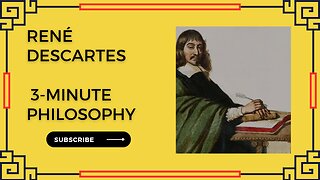 3:25
3:25
PeakIntrigue
1 year agoRené Descartes | 3-Minute Philosophy | Peak Intrigue #philosophy
169 -
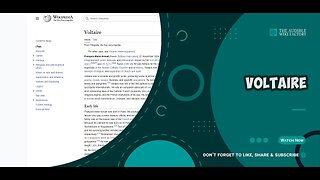 1:00:30
1:00:30
The Audible Wiki Factory
1 year agoFrançois-Marie Arouet was a French Enlightenment writer, historian, and philosopher
100 -
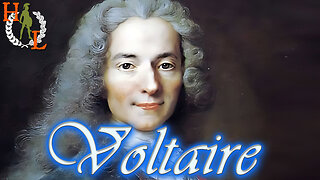 2:10:58
2:10:58
Heroes and Legends Documentary Channel
2 months agoVoltaire: The Rascal Philosopher
22 -
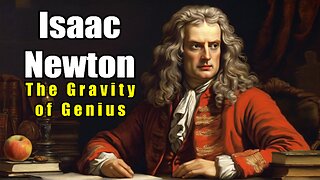 4:40
4:40
100 Historical Figures
3 months agoIsaac Newton - The Gravity of Genius (1643 - 1727)
37 -
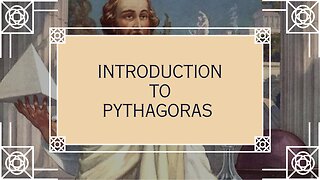 4:15
4:15
PeakIntrigue
1 year agoPythagoras | 3-Minute Philosophy | Peak Intrigue #philosophy #Pythagoras #Pythagoreanism
2521 -
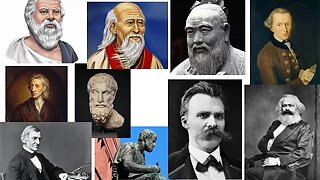 6:05
6:05
Khanphouk
9 months ago $0.06 earnedtop 10 philosophers of all time
75 -
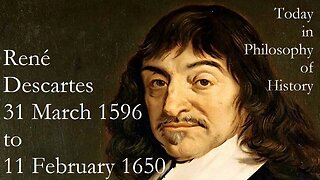 20:01
20:01
Grand Strategy: The View from Oregon
2 months agoRené Descartes and Non-philosophies of History
21 -
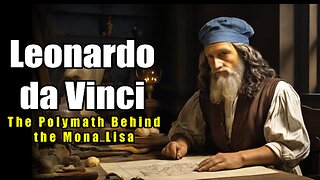 3:06
3:06
100 Historical Figures
3 months agoLeonardo da Vinci - The Polymath Behind the Mona Lisa (1452 - 1519)
24 -
 54:01
54:01
InnerLight
1 year agoThe Betrayal by Technology, A Portrait of Jacques Ellul (1992)
334 -
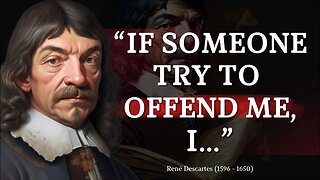 6:12
6:12
Wisdom
1 year agoUse Your MIND WELL! Rene Descartes Quotes.
12